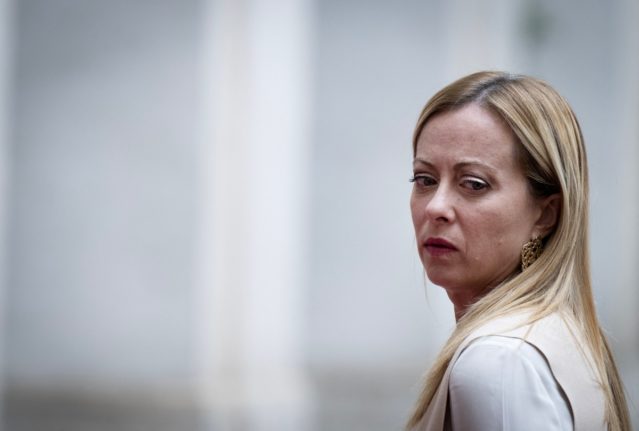Many feared Meloni would take Italy down a radical new path but instead her first 12 months have been marked by a conventional foreign policy and a right-wing but not revolutionary domestic programme, analysts say.
Despite her past euroscepticism, the 46-year-old has sought a largely constructive role with the European Union, aside from a few spats with Paris and Berlin on migration. She has strongly backed Ukraine in its defence against Russia, and is expected to pull Italy out of China’s Belt and Road investment scheme, four years after Rome became the only G7 country to join.
Her support for Kyiv saw her feted in Washington this summer, with US President Biden declaring in the Oval Office that “we have become friends”. At the same time, she has kept her voters onside with tax cuts, tough talk on migration, law and order, and a focus on conservative family values — and her party is more popular than ever.
READ ALSO: Italian PM Meloni announces separation from partner after sleaze scandal
Luigi Scazzieri, a senior research fellow at London’s Centre for European Reform, says her success so far lies in a “balancing act”.
“She’s been able to pull off being both a moderate, being seen as a partner, and also being seen as a radical,” he told AFP – although he questioned how long this would last.
Berlusconi 2.0
Meloni’s post-Fascist Brothers of Italy, founded in 2012, spent a decade on the fringes before bursting through in the September 2022 general election. It came out on top, with 26 percent of the vote.
With Matteo Salvini’s far-right, anti-immigration League party and the late Silvio Berlusconi’s conservative Forza Italia, they formed Italy’s most right-wing government since World War II.
Her party remains popular, currently polling at more than 28 percent, according to YouTrend — something experts attribute to her having delivered on promises.
The government has moved to ease the tax burden, particularly for families — a traditional priority of conservative voters, noted Lorenzo De Sio, professor of political science at Rome’s Luiss university.
Alongside a more relaxed attitude to tax evasion, much of its economic policy is in line with previous right-wing governments, a sort of “Berlusconi 2.0”, De Sio told AFP.
When combined with a more conventional foreign policy than was initially forecast, he said, the government “is decidedly less radical than what we would have expected”.
READ ALSO: What is Italy’s government doing about the falling birth rate?
Yet Meloni has also sought to speak to the many voters who were drawn to her strong stance on immigration, on security and her talk of Italy’s “Judeo-Christian” roots.
After highlighting family values in the election campaign, the government blocked local authorities from registering the children of gay couples, who in Italy are not allowed to adopt or use surrogates.
Meloni herself insists children need a mother and father, although she is relaxed about marriage. On Friday, she announced the end of her decade-long relationship with the father of her seven-year-old daughter, who was caught on tape apparently admitting to an affair.
Migration woes
Coalition members routinely spout far-right rhetoric, from the Senate speaker saying he would be disappointed if his son was gay, to one of Meloni’s allies talking about the “ethnic replacement” of Italians by migrants.
Migration was another major campaign issue. Meloni and Salvini both promised to stop migrant boats from North Africa landing on Italy’s shores. But despite a raft of decree laws, the number of arrivals has more than doubled compared to last year.
READ ALSO: ‘We hoped for better’: How Italy’s government has floundered on migration
Meloni has turned to the European Union for help, supporting a new deal with Tunisia aimed at stemming irregular migration from that country. And she has hailed an EU pact for sharing responsibility for asylum cases across the 27-nation bloc.
But the results of these efforts have yet to be seen, and a new YouTrend poll Friday for SkyTG24 puts immigration at the top of voters’ list of complaints about the government.
Meloni has admitted she hoped to do “better” on migration. She showed her frustration when she lashed out at a Sicilian judge who refused to apply one of her decrees.
The judge said the decree violated both EU and Italian law.
The economy, meanwhile, is not doing as well as Meloni had hoped, with Rome last month lowering its growth forecasts and warning of a higher-than-expected
deficit.
Adding to the pressure on Meloni is Salvini, who has upped his anti-EU, anti-migrant rhetoric ahead of European Parliament elections next year.
Scazzieri said if Meloni cannot show her approach to the EU is serving Italy’s interests, she may feel obliged to change course. “I worry slightly going ahead that Meloni’s more constructive tone will be eroded because she doesn’t actually have that much to show for it,” he said.



 Please whitelist us to continue reading.
Please whitelist us to continue reading.
Member comments